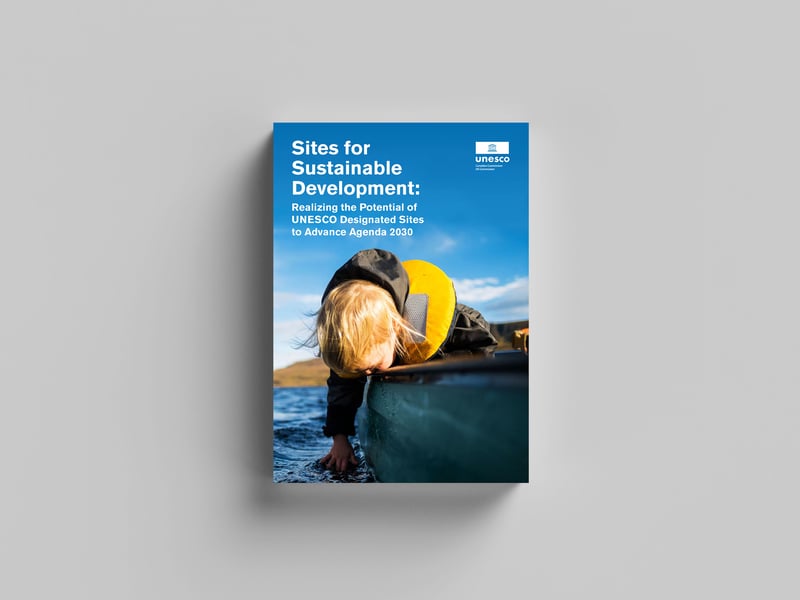#Project
UNESCO Sites for Sustainable Development
Home > Programmes > #NationalValue
UNESCO sites are uniquely placed to address 21st century sustainable development challenges them by bringing people, communities, businesses, and organisations together to mobilise solutions locally, regionally and internationally.
People and communities worldwide are facing unprecedented challenges that are set to accelerate in the coming decades.
From catastrophic flooding to ecosystem collapse or extreme poverty, no one will be spared. We urgently need partnerships, resources and activities at the local, national and international levels to tackle, mitigate or adapt to these interconnected challenges.
This report outlines how UNESCO’s global network of designated sites — World Heritage Sites, global geoparks and biosphere reserves — can help stakeholders carry out sustainable development approaches to do just that.

A word from UNESCO
‘This report shows the unique value offered by UNESCO projects in Canada and the UK. They embody community and enable us to preserve and enjoy our most special places and culture. They also pioneer solutions to some of the world’s most pressing problems and inspire hope in these unprecedented times.’
Assistant Director-General Shamila Nair-Bedouelle, in Paris, France, 06 October 2022
Press Release
A new report reveals why governments should invest in their UNESCO designated sites to help meet global commitments
London, UK, 6 October 2022 – Faced with a growing energy crisis, record greenhouse gas concentrations, and increasing extreme weather events, COP27 to be held in Egypt in November seeks renewed cooperation between countries to deliver on the Paris Agreement. Meanwhile, world leaders will meet in Montreal, Canada, in December during COP15 to agree on the post-2020 global biodiversity framework.
A new study published today by the UK and Canadian UNESCO Commissions for UNESCO has found that UNESCO designated sites face a range of global challenges, but it also shows that, with additional support, they can be at the forefront of generating and sharing innovative local approaches to tackling these challenges. For the first time, it provides a framework that groups Biosphere Reserves, Global Geoparks and World Heritage Sites as UNESCO sites for sustainable development – for how they connect global goals to local actions, and have the tools to effect real, long-lasting progress towards Agenda 2030.
UNESCO sites are a global network that span the globe, cover 10 million km2 (the geographical size of the USA), and are home to hundreds of millions of people. The study shows that these sites in the UK and Canada face significant threats ranging from over-tourism, flooding, storms, and invasive species to pressures from housing and commercial development. Despite this, the report shows the UNESCO sites are uniquely placed to address them by bringing people, communities, businesses, and organizations together to mobilize solutions locally, regionally, and internationally.
#PressContact
Matthew Rabagliati
Head of Policy, Communications and Research
UK National Commission for UNESCO
#Quote
“UNESCO is most famous for its World Heritage Sites, Global Geoparks and Biosphere Reserves. These are exceptionally special places, but places that are also as vulnerable as anywhere else to the threats of climate change and overdevelopment. However, as this report shows, these sites also have all the ingredients communities and stakeholders need to plan together for a sustainable future. Hundreds of millions of people live on the 10 million square kilometers of this extraordinary global network: we must continue to respect these sites and invest in them so that they can show us the way.”
Ambassador Laura Davies, UK Permanent Delegate to UNESCO, Foreign and Commonwealth Officein Paris, France, 6 October 2022
Case studies: Sustainable Development in Action
The Skell Valley Project
Fountains Abbey and Studley Royal UNESCO World Heritage Site in Yorkshire, England, is working with communities and partners along the 12-mile River Skell to help make the area sustainable for those who live, work and visit this extraordinary place.
In August 2022, the UK National Commission for UNESCO in partnership with the GREAT Campaign and UK Delegation to UNESCO, visited the World Heritage Site, owned and operated by the National Trust, to see the Skell Valley project in action
The Waterfall Project
Waterfall Country is a microcosm of the Fforest Fawr UNESCO Global Geopark and wider Brecon Beacons National Park, which is facing many sustainable development challenges ranging from the impacts of climate change, biodiversity loss and over-tourism.
To address this, communities in Waterfall Country and the public sector formed a partnership to address multiple local problems and improve prospects for local communities, visitors, and the natural world. Fforest Fawr UNESCO Global Geopark is one such partner. Waterfall Country Cymru was established in 2020/21 to formalise community representation, working alongside public sector partners as part of the Waterfall Country Partnership and developing local initiatives by the community for the community.
This film, produced by Christian Britten & Sam Irving of RewiredLife, shows some of the challenges the area faces and how the Geopark and other partners are working collaboratively to ensure that the natural environment is maintained for generations to come.

